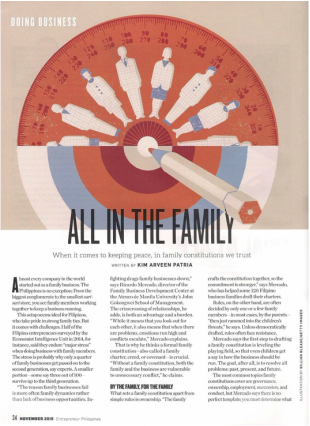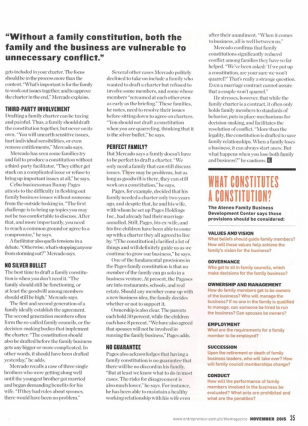When it comes to keeping peace, in family constitution we trust
Written by KIM ARVEEN PATRIA
This set up seems ideal for Filipinos, who take pride in strong family ties. But it comes with challenges. Half of the Filipino entrepreneurs surveyed by the Econonmist Intelligence Unit in 2014, for instance, said they endure "major stress" when doing business with family members. The stress probably why only a quarter of family businesses get passed on to the second generation, say experts. A smaller portion-some say three out of 100-survive up to the third generation.
"The reason family businesses fail is more often family dynamics rather than lack of business opportunities. In fighting drags family businesses down," says Ricardo Mercado, director of the Family Business Development Center at the Ateneo de Manila University's John Gokongwei School of Management.
The crisscrossing of relationships, he adds, is both an advantage and a burden.
"While it means that you look out for each other, it also means thath when there are problems, emotions run high and conflicts escalate, " Mercado explains.
That is why he thinks a formal family constitution--also called a family charter, creed, or covenant--is crucial.
"Without a family constitution, both the family and the business are vulnerable to unncessary conflict," he claims
BY THE FAMILY, FOR THE FAMILY
What sets a family constitution apart from simple rules in owenership. "The family crafts the constitution together, so the commitment is stronger," says Mercado, who has helped some 120 Filipino business families draft their charters.
Rules, on the other hand, are often decided by only one or a few family members-in most cases, by the parents-"then just rammed into the children's throats,"he says. Unless democratically drafted, rules often face resistance.
Mercado says the first step to drafting a family constitution is leveling the playing field, so that even children get a say in how the business should be run. The goal, after all, is to resolve all problems: past, presnt, and future.
The most common topics family constitutions cover are governance, ownership, employment, succession, and conduct, but Mercado says there is no perfect template; you must determine what gets included inyour charter: The focus should be in the process more than the content. "What's important is for the family to work out issues together; and to approve the charter in the end," Mercado explains.
THIRD-PARTY INVOLVEMENT
Drafting a family charter can be taxing and painful. Thus, a family should draft the constitution together; but never on its own. "You will unearth sensitive issues, hurt individual sensibilities, or even remove entitlements," Mercado says.
Mercado has seen some families try and fail to produce a constitution without a third-party facilitator. "They either get stuck on a complicated issue or refuse to bring up important issues ar all," he says.
Cebu businessman Bunny Pages attests to the difficulty in fleshing out family business issues without someone from the outside looking in. "The first challenge is to bring up topics you may not be too comfortable to discuss. After that, and more importantly, you need to reach a common ground or agree to a compromise." he says.
A facilitator also quells tensions in a debate. "Otherwise, what's stopping anyone from storming out?" Mercado says.
NO SILVER BULLET
The best time to draft a family constitution is when you don't need it. "The family should still be functioning, or at least the goodwill among members should still be high," Mercado says.
The first and second generation of a family ideally establish the agreement. The second generation members often form the so-called family councils, or the decision-making bodies that implement the charter. "The constitution should also be drafted before the family business gets any bigger or more complicated. In other words, it should have been drafted yesterday," he adds.
Mercado recalls a case of three single brothers who were getting along well until the youngest brother got married and began demanding benefits for his wife. "If they had rules about spouses, there would have been no problem."
Several other cases Mercado politely declined to take on include a family who wanted to draft a charter but refused to involve some members, and some whose members "screamed at each other even as early as the briefing." These families, he notes, need to resolve their issues before sitting down to agree on charters. "You should not draft a constitution when you are quarreling, thinking that it is the silver bullet," he says.
PERFECT FAMILY?
But Mercado says a family doesn't have to be perfect to draft a charter. "We only need a family that can still discuss issues. There may be problems, but as long as goodwill is there, they can still work on a constitution," he says.
Pages, for example, decided that his family needed a charter only two years ago, and despite that, he and his wife, with whom he set up Pages Holdings Inc., had already had their marriage annulled. Still, Pages, his ex-wife, and his five children have been able to come up with a charter they all agreed to live by. "[The constitution] clarified a lot of things and will definitely guide us as we continue to grow out business," he says.
One of the fundamental provisions in the Pages family constitution is that no member of the family can go solo in a business venture. At present, the Pageses are into restaurants, schools, and real estate. Should any member come up with a new business idea, the family decides whether or not to support it.
Ownership is also clear. The parents each hold 30 percent, while the children each have 8 percent. "We have also agreed that spouses will not be involved in running the family " business," Pages adds.
NO GUARANTEE
Pages also acknowledges that having a family constitution is no guarantee that there will be no discord in his family. "But at least we know what to do in most cases. The risks for disagreement is also much lower," he says. For instance, he has been able to maintain a healthy working relationship with his wife even after their annulment. "When it comes to business, all is well between us." Mercado confirms that family constitutions significantly reduced conflict among families they have so far helped. "We've been asked: "If we put up a constitution, are you sure we won't quarrel?" That's really a strange questions. Even a marriage contract cannot assure that a couple won't quarrel."
He stresses, however, that while the family charter is a contract, it often only holds family members to standards of behavior, puts in place mechanisms for decision-making, and facilitates the resolution of conflict. "More than the legality, the constitution is drafted to save family relationships. When a family loses a business, it can always start anew. But what happens when you lose both family and business?" he cautions.
WHAT CONSTITUTES A CONSTITUTION?
The Ateneo Family Business Development Center says these provisions should be considered:
VALUES AND VISION
What beliefs should guide family members?
How will these values help achieve the family's vision for the business?
GOVERNANCE
Who get to sit in fmaily councils, which make decisions for the family business?
OWNERSHIP AND MANAGEMENT
How do family members get to be owners of the business? Who will manage the business? If no one in the family is qualified to manage, can someone be hired to run the business? Can spouses be owners?
EMPLOYMENT
What are the requirements for a family member to be employed?
SUCCESSION
Upon the retirement or death of family business leaders, who will take over? How will family council memberships change?
CONDUCT
How will the performance of family members involved in the business be evaluated? What acts are prohibited and what are the penalties?




 RSS Feed
RSS Feed
